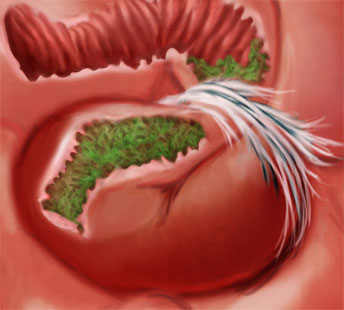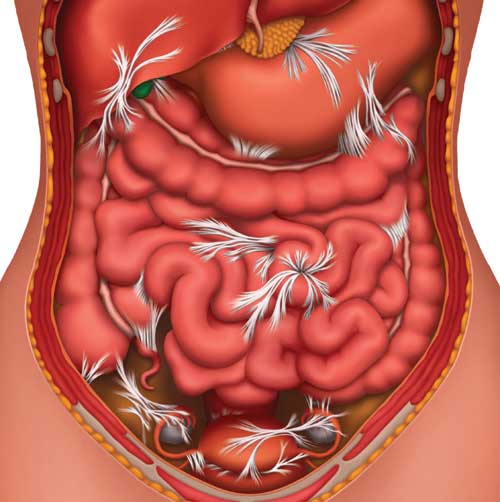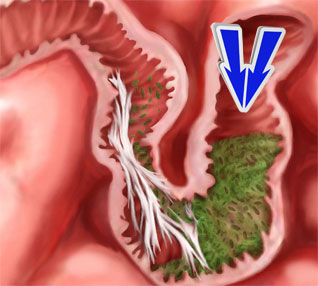What is SIBO (Small Intestinal Bacterial Overgrowth)?
 A person is diagnosed with SIBO when there is an increased number of bacteria or a significant change in the types of bacteria found in the small bowel. A common misconception is that SIBO results from a single type of bacteria. Because a healthy bowel contains a spectrum of bacteria, SIBO occurs when those multiple types of bacteria increase to levels that are no longer considered healthy.
A person is diagnosed with SIBO when there is an increased number of bacteria or a significant change in the types of bacteria found in the small bowel. A common misconception is that SIBO results from a single type of bacteria. Because a healthy bowel contains a spectrum of bacteria, SIBO occurs when those multiple types of bacteria increase to levels that are no longer considered healthy.
SIBO can cause malabsorption of nutrients, which results in vitamin deficiencies and weight loss. Persistent SIBO can also lead to IBS, leaky gut, inflammation, and increased sensitivity to food allergies.
What causes SIBO?
Pinpointing the exact cause of SIBO can be difficult because of the condition’s complexity. There are several common predictors of SIBO, including Crohn’s disease and diverticulitis, as well as the use of antibiotics, acid-blockers, and other medications that alter the normal gut flora.
 Irritable bowel syndrome
Irritable bowel syndrome- Celiac disease
- Bowel surgery
- Bowel obstruction
- Prior use of antibiotics
- Decreased stomach acid (can be caused by acid blockers)
- Abdominal adhesions
- Decreased gut motility
If you have one or more of these risk factors and experience any of the following symptoms, you may have SIBO:
- Abdominal pain
- Severe bloating
- Abdominal distension
- Diarrhea or constipation
- Frequent gas and belching
What is gut motility?
Gut motility is a measure of the ability of food to pass through the digestive tract. Many issues can arise from poor gut motility, particularly malnutrition, which results from the body’s inability to absorb nutrients properly. The body may also have trouble absorbing medications, making it difficult to fully treat and resolve SIBO. Here are a few signs that you may have compromised gut motility:
|
|
What causes reduced gut motility?
Gut motility is affected by motility disorders, which hinder the digestive system’s ability to move food through the digestive tract and absorb critical nutrients. The following are some of the more common motility disorders.
Adhesions
 Adhesions can form in the abdomen after surgery, infection, inflammation, or trauma as the first step in the body’s natural healing process. Once formed, they remain in the body for life. The symptoms of abdominal adhesions can be similar to those of SIBO and, thus, are often confused. These symptoms include abdominal pain, infrequent bowel movements, abdominal distension, and severe bloating after eating, reduced gut motility, and painful bowel movements.
Adhesions can form in the abdomen after surgery, infection, inflammation, or trauma as the first step in the body’s natural healing process. Once formed, they remain in the body for life. The symptoms of abdominal adhesions can be similar to those of SIBO and, thus, are often confused. These symptoms include abdominal pain, infrequent bowel movements, abdominal distension, and severe bloating after eating, reduced gut motility, and painful bowel movements.
Adhesions can squeeze the bowel, wrapping tightly around it and causing a severe decrease in motility. Abdominal adhesions are also one of the primary causes of bowel obstructions.
Gastroesophageal Reflux Disease (GERD)
GERD is associated with heartburn and acid regurgitation. This condition is common and often not associated with a disease. Treatments can range from lifestyle and diet modifications to surgery, in severe cases.
Intestinal Dysmotility
Intestinal dysmotility is characterized by abnormal motility in the small intestine due to weak or unsynchronized muscle contractions. The abnormal patterns can cause the symptoms of a bowel obstruction.
Gastroparesis
This is a disorder that prevents the stomach from emptying its contents at a normal speed. The most common cause of gastroparesis is diabetes; gastroparesis is also a common complication from some surgeries. Patients with gastroparesis usually have chronic nausea and vomiting; some also experience bloating and early ‘fullness’ when eating.
How can reduced gut motility cause SIBO?
SIBO is the result of abnormal motility in the bowel, which can stem from any of the conditions or risk factors listed above. Caused by poor motility, there is a buildup of bacteria in the upper part of the small intestine that is unable to escape. SIBO is normally treated with a combination of medications and dietary changes. Unfortunately, the medication may be ineffective when gut motility is reduced by adhesions. Adhesions can form after trauma, infection, or surgery and significantly reduce bowel motility by wrapping around the bowels and squeezing them.
When medications are used to treat SIBO, the excess bacteria is killed — a process called “die-off.” When abdominal adhesions prevent the bacteria from exiting the small bowel, it is common for SIBO to return. The “recurring SIBO” persists until the adhesions, which are trapping the die-off, are successfully treated.
Treatment for adhesions that perpetuate SIBO
A common method for removing adhesions is a surgical procedure called lysis of adhesions, where the surgeon cuts or burns the scar tissue. Unfortunately, this approach often results in the formation of new adhesions as the body heals from the surgery. Once the adhesions are treated, medications can work better, and intestinal mobility, motility, and absorption can improve significantly.
A manual physical therapy is an effective alternative for treating SIBO and abdominal adhesions, without the formation of post-surgical adhesions.
References
- http://emedicine.medscape.com/article/179937-overview
- http://www.iffgd.org/site/gi-disorders/motility-disorders/
- https://en.wikibooks.org/wiki/Medical_Physiology/Gastrointestinal_Physiology/Motility
- http://chriskresser.com/sibo-what-causes-it-and-why-its-so-hard-to-treat/


